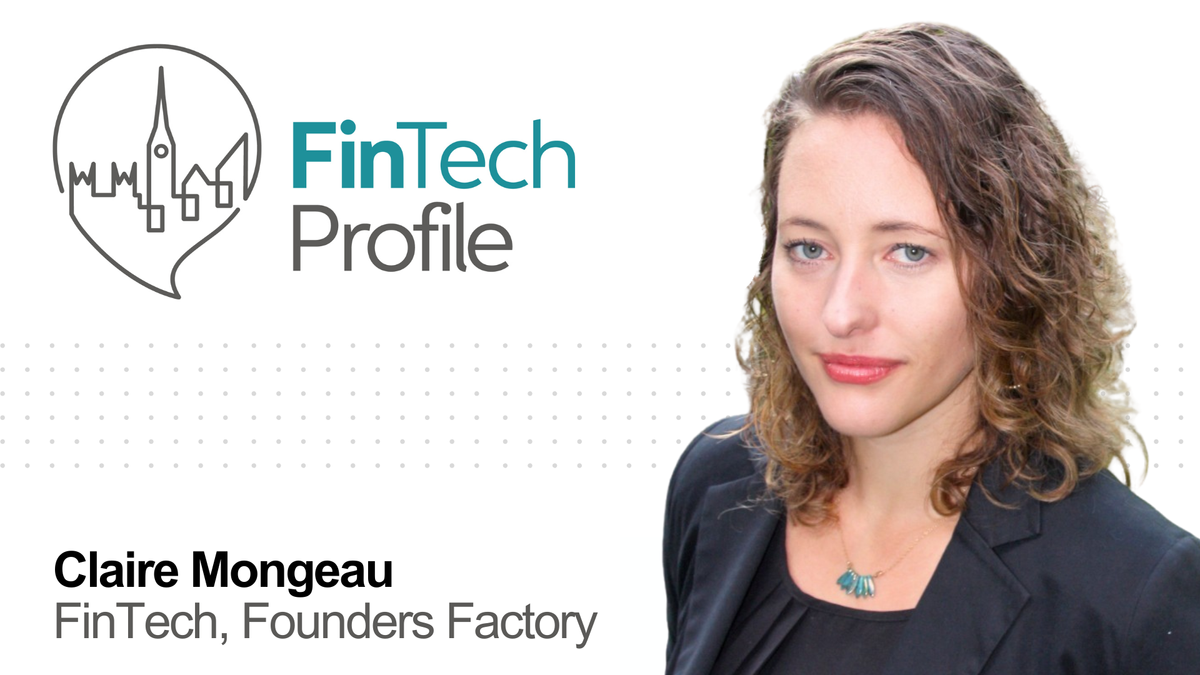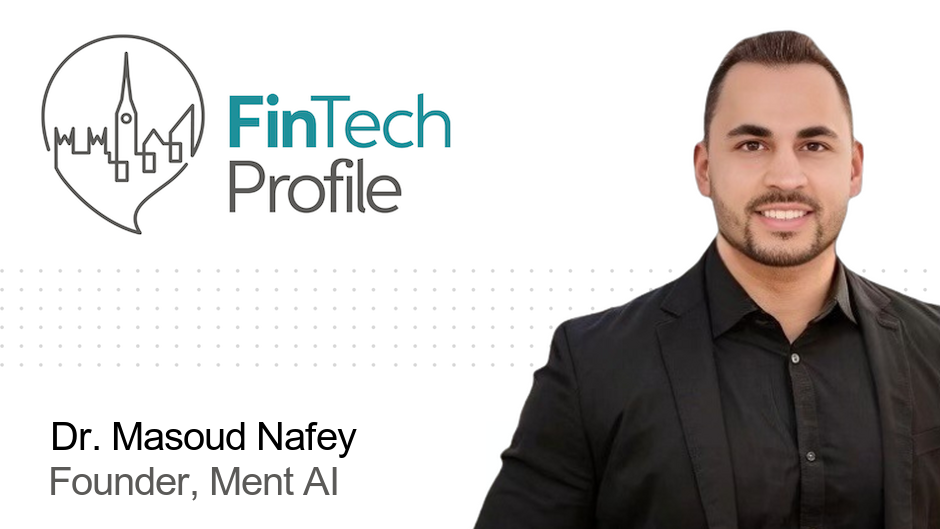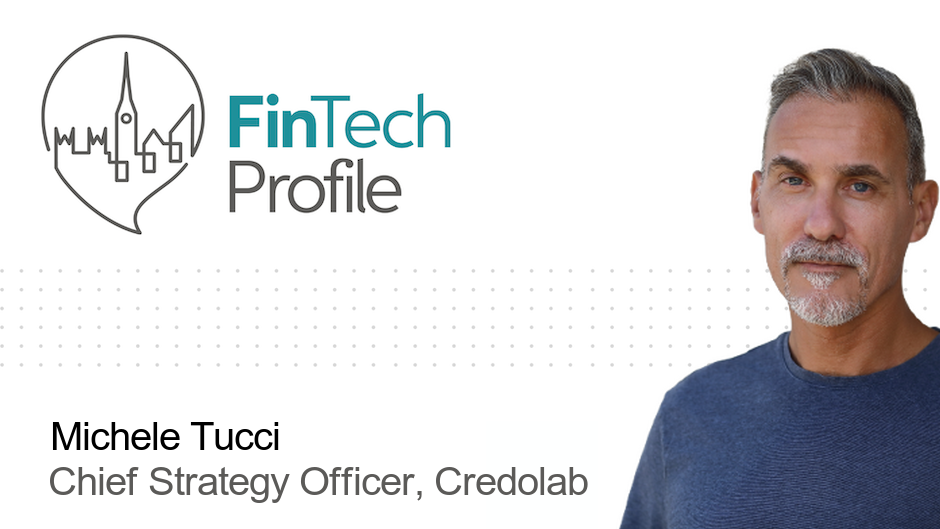Claire Mongeau, FinTech Investor, Fintech, Founders Factory

Today we're meeting Claire Mongeau, Investor, Fintech at Founders Factory. They specialize in building and funding startups together with exceptional entrepreneurs and the world's leading companies.
Over to you Claire - my questions are in bold:
Who are you and what's your background? Can you tell us about how your background has shaped your approach to venture capital and investing in FinTech?
While I'm now a fintech investor, I tend to call myself a "recovering entrepreneur". I'm originally from the US, but spent the first 8 years of my career working as an operator in startups tackling accessible education in emerging markets.
My route into fintech goes back to my time living in Nairobi. I first spent a few years helping a growth-stage chain of low-cost private schools scale to 450 academies and 100k+ students across Kenya and Uganda. While spending time with parents and teachers across the region, I saw a massive market gap - low-income families often spent upwards of 25% of their income on education, but without regular smartphone or internet access, they didn't have the most powerful tools to spend it on. So I launched M-Shule, which is the first personalised, mobile learning platform in Africa to connect learners with tailored tutoring, training, assessments and data through SMS. I led the company from 2017 to 2022, at which point I moved to the board. The company is now reaching more than 300,000 students, demonstrably proven its impact to build everything from academic to life skills, and operating at a healthy profit.
During all of this, most of my growth and operational strategy had to be focused on responding to the financial landscape. The lack of regular family income often kept learners out of school, but even more critically, enabling financial infrastructure to build and run good innovation was missing. One health scare or economic shock could shutter an entire enterprise, banking systems were archaic, and barely-digitized systems couldn't reach or serve consumers. One breakthrough innovation - mobile money over USSD, MPesa - unlocked a ton of opportunity for financial services in the region, but so much more had to be done to let innovation really thrive.
This is a mindset that I've kept with me in my role as a fintech investor. Fintech is really an enabling technology—not just for education, but for health, prosperity, independence, and general social mobility. This belief has kept me motivated to keep putting money towards the right founders who are creating the next generation of the financial world.
What is your job title and what are your general responsibilities? How do you balance evaluating new investments with mentoring portfolio companies? What does your typical week look like?
I'm a Fintech Investor at Founders Factory, where I lead on making investments alongside our UK fintech partner Aviva. Together, we're interested in backing companies innovating at the cutting edge of insurtech, wealth, proptech, and asset management.
My typical week ranges from speaking to prospective investments, aligning with our partners at Aviva, as well as meeting with our current portfolio to support fundraising efforts. I'm a keen advocate for women in the fintech community, having organised various breakfasts, roundtables, and even a pub quiz.
Could you explain the Founders Factory model and how it combines corporate support from Aviva with investment? What makes this approach different from traditional VCs or corporate venture capital?
Founders Factory's corporate partner model is differentiated in that it combines capital, bespoke operational support, and access to relevant corporate partners for each sector. This combination of these things is designed to give early stage founders a real unfair advantage over the competition.
Engaging with large corporations is one of the hardest but most beneficial things you can do as a startup. For fintech startups, for instance, the opportunity to partner at this stage with a company like Aviva is something that might take startups years to procure. It gives our founders leading market insights in their industry, it offers access to senior leadership, as well as pathways to commercial partnerships.
I think about it like this. Who owns finance? These large scale institutions—like Aviva. If you're thinking about commercialisation, then these financial institutions have a critical insight: they are your target buyer, or even acquirer.
You mentioned developing investment theses with Aviva. Could you share some of the key areas or themes you're particularly excited about right now? How does working with a large insurer like Aviva influence your investment focus?
For us as an investor, the benefit of working with Aviva is insight into huge problems they, and the industry, may be facing, helping us identify considerable opportunities across a number of sectors across financial services, insurance, wealth, and so on. In this sense, having them as a co-investor is derisking many of our concepts much earlier on.
Working with corporate partners helps us really get a sense of what they are worrying about now, and what they're going to be worried about in three to five years down the line. That helps influence the decisions we make around the companies we're building and investing in. There's a few themes that really stand out in the conversations we're having currently.
The future of AI agents is obviously a huge theme across any industry, but particularly in financial services. Much of the existing foundational technology—from KYC to KYB, and even 2-Factor Authentication—is predicated on human behaviour. So what happens when we start having agents deploying on our behalf?
I'm particularly interested in conversations around the changing nature of our financial worlds. For one, typical financial units—traditionally the family, with one breadwinner (often male)—are quickly changing, and our financial services aren't being adapted to reflect this. I'd like to see products for new financial units, like housemates or friendship groups, that cater to these different lifestyles.
The same applies to wealth assets, which look vastly different from just our income and net worth. Everything from reputation to brand, image, and following are all becoming a unit of wealth, and we don't have financial products designed for this. Could you inherit someone's Instagram following, for instance?
Having been both a founder and now an investor, how does your entrepreneurial experience influence your approach to evaluating companies and supporting founders? What's something you wish more VCs understood about the founder experience?
I think it gives me an ability to cut through the noise a bit faster. Having sat on the other side of the table, I can see earlier on if a founder is saying what I want to hear, or if they actually have a good set of assumptions that they're going to methodically test out. Lots of investors do this through pattern matching—but having built a profitable startup means I've been able to figure out what is worth spending time on, what experiments you should be running, and so on.
Having been a founder myself, I like to think this helps me build rapport and trust with founders much earlier on. This not only means I get more honest answers when I'm trying to evaluate, it also means we can know how we can really support them better.
My advice to other VCs would be that there is a lot more work to be done to uncover the absolute best founders to back. I think VCs, particularly in the UK, take a lot of learned behaviours from corporate finance and banking: sourcing deal flow from their immediate network, doing business in elite settings (private members clubs, etc.). But this means you're missing out on a lot of value. Much more work is required to find those best in class founders with alternative profiles who may be building something generation-defining.
If you had a magic wand, what one thing would you change in the banking and/or FinTech sector?
I think financial services are being held back by a serious lack of data around these new types of financial units, wealth creation units, and young consumers. AI is making it increasingly possible to build these fantastic new products and services, but without enough high quality data, these will never be truly personalised.
So if I could wave my magic wand, it would be to create a critical mass of data that can really pave the way for the next generation to deploy AI that helps us achieve society-wide financial access.
What is your message for the larger players in the Financial Services marketplace? What would you advise CEOs of major banks regarding their approach to crypto, stable coins, and AI integration?
Well, to follow on from my above point—we don't need a magic wand! Our huge financial incumbents already have access to this type of data. So my message to these large players would be to integrate their data silos and make it publicly accessible for innovation.
Whoever is able to unlock the power of their data first will be the company that can really leverage AI—for everything from hyper personalised insurance to offering the best rates on loans—and truly capitalise on its benefits. This will be where we see the first AI-powered financial super app.
Can you highlight some recent portfolio companies that we should be following?
Having been investing with Aviva for eight years now, we're starting to see our first success stories emerge.
Scan.com, who are building the booking and payment infrastructure for diagnostic scans, are rapidly gaining traction in the UK and US, looking likely to reach $100M in revenue this year. Aviva has been one of their main investors, and they've already raised over $60M. It's clear they've found a huge but solvable problem, and look set to capture a multi-billion dollar market.
Tembo, built in our Aviva Venture Studio, is also experiencing exciting levels of growth. They're aspiring to be the go-to fintech platform for first-time home buyers, through innovative mortgage lending and highly competitive saving products. In 2024 alone, they helped 4000 people buy their homes, and capped off the year by announcing their $18M Series B.
[ Editor's note: We recently interviewed Richard Dana, Founder of Tembo here on FinTech Profile. ]
More recently, we've backed a company called Meshed, who are an AI powered insurance broker for SMEs. They're building a fantastic product with clear demand, founded by a team with deep insurance expertise.
For founders keen to talk with you about investment, what's the best way of connecting with you and the team?
Send me a message on LinkedIn!
Where do you get your Financial Services/FinTech industry news from?
Can you list 3 people you rate from the FinTech and/or Financial Services sector that we should be following on LinkedIn, and why?
What FinTech services (and/or apps) do you personally use?
- Plum
- Good old-fashioned Schwab
- Monzo + Revolut
- Interactive Advisor
- Wise
What's the best new FinTech product or service you've seen recently?
- Skyfire: Empower your AI agents with payments
Thank you very much, Claire!
Read more about Claire on LinkedIn and find out more about Founders Factory at foundersfactory.com.




